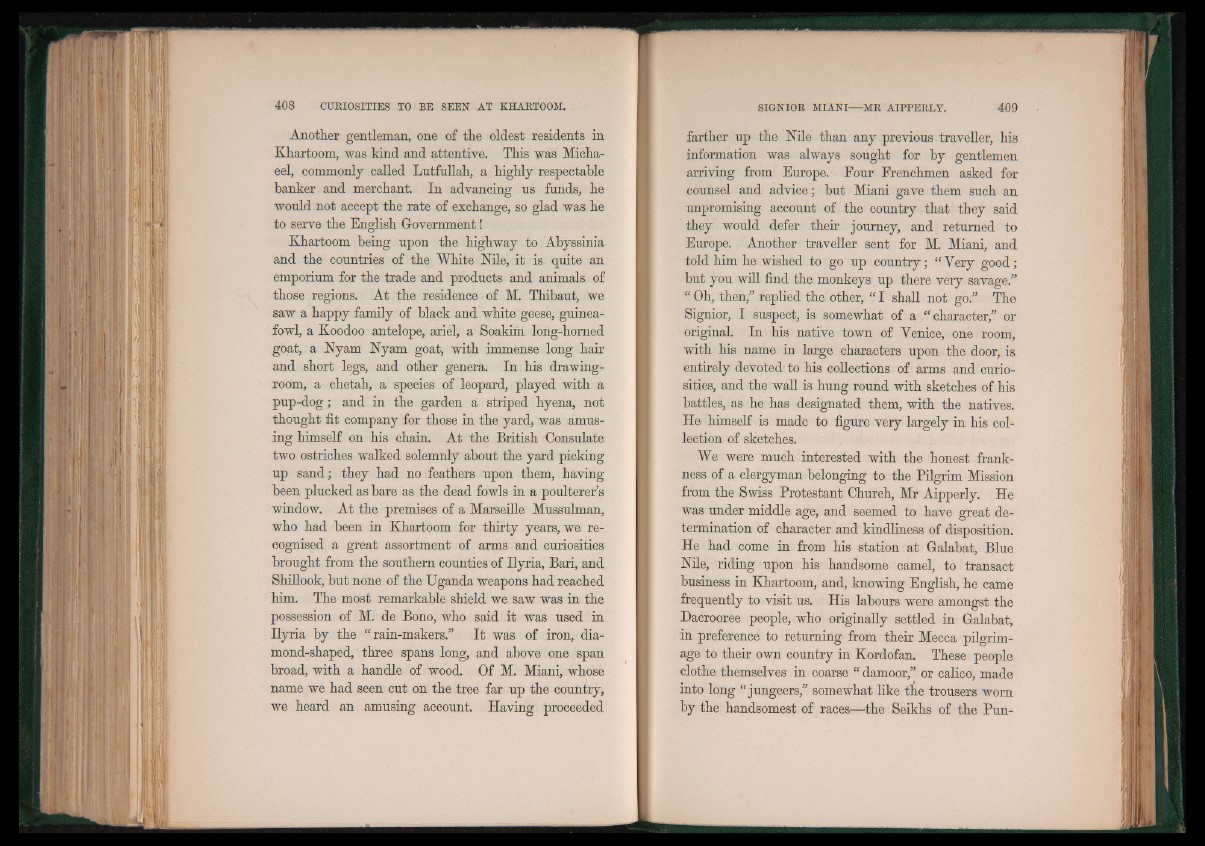
Another gentleman, one of the oldest residents in
Khartoom, was kind and attentive. This was Mieha-
eel, commonly called Lutfullah, a highly respectable
banker and merchant. In advancing ns funds, he
would not accept the rate of exchange, so glad was he
to serve the English Government!
Khartoom being upon the highway to Abyssinia
and the countries of the White Nile, it is quite an
emporium for the trade and products and animals of
those regions. At the residence of M. Thibaut, we
saw a happy family of black and white geese, guinea-
fowl, a Koodoo antelope, ariel, a Soakim long-homed
goat, a Nyam Nyam goat, with immense long hair
and short legs, and other genera. In his drawingroom,
a chetah, a species of leopard, played with a
pup-dog; and in the garden a striped hyena, not
thought fit company for those in the yard, was amusing
himself on his chain. At the British Consulate
two ostriches walked solemnly about the yard picking
up sand; they had no feathers upon them, having
been plucked as bare as the dead fowls in a poulterer’s
window. At the premises of a Marseille Mussulman,
who had been in Khartoom for thirty years, we recognised
a great assortment of arms and curiosities
brought from the southern counties of Ilyria, Bari, and
Shillook, but none of the Uganda weapons had reached
him. The most remarkable shield we saw was in the
possession of M. de Bono, who said it was used in
Ilyria by the “ rain-makers.” I t was of iron, diamond
shaped, three spans long, and above one span
broad, with a handle of wood. Of M. Mia.ni, whose
name we had seen cut on the tree far up the country,
we heard an amusing account. Having proceeded
farther up the Nile than any previous traveller, his
information was always sought for by gentlemen
arriving from Europe. Four Frenchmen asked for
counsel and advice; but Miani gave them such an
unpromising account of the country that they said
they would defer their journey, and returned to
Europe. Another traveller sent for M. Miani, and
told him he wished to go up country; “Very good;
but you will find the monkeys up there very savage.”
“ Oh, then,” replied the other, “ I shall not go.” The
Signior, I suspect, is somewhat of a “ character,” or
original. In his native town of Venice, one room,
with his name in large characters upon the door,„is
entirely devoted to his collections of arms and curiosities,
and the wall is hung round with sketches of his
battles, as he has designated them, with the natives.
He himself is made to figure very largely in his collection
of sketches.
"We were much interested with the honest frankness
of a clergyman belonging to the Pilgrim Mission
from the Swiss Protestant Church, Mr Aipperly. He
was under middle age, and seemed to have great determination
of character and kindliness of disposition.
He had come in from his station at Galabat, Blue
Nile, riding upon his handsome camel, to transact
business in Khartoom, and, knowing English, he came
frequently to visit us. His labours were amongst the
Dacrooree people, who originally settled in Galabat,
in preference to returning from their Mecca pilgrimage
to their own country in Kordofan. These people
clothe themselves in coarse “ damoor,” or calico, made
into long “jungeers,” somewhat like the trousers worn
by the handsomest of races—the Seikhs of the Pun